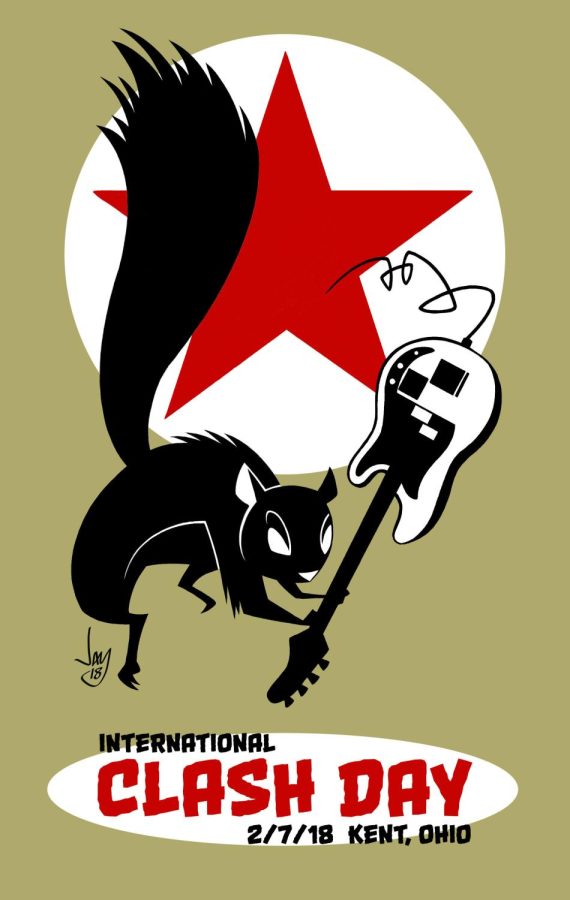Downtown bar rocks International Clash Day
February 8, 2018
A pirate radio station manifested on the second floor of the Zephyr Tavern Wednesday night, as a sociology professor aimed to broadcast a strong message of D.I.Y ideology to the his community and the world.
Zach Schiller, assistant professor of sociology, had been planning to host the first ever International Clash Day in Kent for over a year. He brought the idea up to Mayor of Kent, Jerry Fiala and in 2017, Feb. 7 was made Clash Day in the city.
Inspired the world’s first Clash Day in 2013 by WKEXP radio station in Seattle, Schiller wanted to form a town wide event that gave “a sense of activism, a sense of urgency around social justice issues, a sense of importance around creating a community through music,” in the name of the Clash.
The Clash were a punk band from the late 1970s that helped put punk rock in the mainstream music landscape by challenging cultural norms of western civilization.
“By putting together a lot of different kinds of events all over town that showcase the importance of giving voice I think that symbolized quite effectively with this radio station we have built for the day,” Schiller said.
Schiller said there are upwards of 16 governments that have established Feb. 7 as International Clash Day, with 99 stations broadcasting music in the name of the Clash across all seven continents, including research stations in Antarctica.
“This speaks volumes to what the Clash’s message was; get out and do something, get out of your comfort zone, do something crazy,” Schiller said.
Events were held all over downtown including a workshop on expression for kindergartners at Scribbles Coffee and a conversation about the connections between music, media and culture at the Kent State Student Center.
Store fronts participating in the event downtown were selling Clash Day merchandise in which the proceeds would go to benefit the Kent Books for Prisoners Organization.
Schiller said this that by making this organization the beneficiary gives voice to the overwhelming mass incarceration issue in the United States.
An issue that Schiller said is “probably the biggest social justice issue of our time.”
“In this country its increasingly a crime to be poor so by having this event in this way we are trying to help spotlight both organizations and people in this town that are working everyday to make a difference for the world we are trying to build.”
Also included in the days events was a workshop for children to learn puck rock power chords at the Standing Rock Cultural Arts Center.
Multiple electric guitars connected to amps were placed on the gallery floor, where instructors rocked out with kids.
Bengt George, a graduate student in sociology, assisted with the workshop and is active with books for prisoners program.
George said the event was designed around the ethos of the punk rock that emerged from the Clash.
“In terms of music, just picking up a guitar, starting a band and just doing things instead of asking for permission in some cases or waiting for someone else to do it,” George said. “One of the theme that emerged with all the different things we are doing is giving voice in general. Teaching kids to express themselves using music that’s one way to do that.”
The Clash played on Kent State’s campus in 1982 which gave legitimacy to the punk scene already present in the area.
Bands like Devo and the Pretenders were already gaining ground in Akron before they too would come into the national spotlight and be remembered as legends in the genre.
Kelly Dietrick, owner of opperated of Troppus Projects, participated in Clash Day as a new business and hosted an exhibition about the Clash playing on Kent State’s campus and history of punk bands in town.
Pencils, markers, paper of various colors and tape were placed on tables to make zines to reflect the D.I.Y ideology expressed through punk culture with the exhibit.
“As an art space I was interested in using Clash Day as a moment to highlight this idea that when you want to do something or say something or make a difference then you do it,” Dietrick said.
“You have to make an opportunity to do it. (The Clash) were trying to send a message and use their music and what they did to make a difference.”
Put together, all the events formed a cohesive look into the influence of the Clash’s message across the world through the lense of a college town in Ohio.
Next year, Schiller hopes to forward the model of social justice for the incarcerated in next years festival by getting involved with Jail Guitar Doors organization that sends music materials to inmates so that they might express themselves through music.
The name Jail Guitars Doors is reference to a Clash song about Wayne Cramer, a member of MC-5, that was imprisoned for drugs. Cramer now spearheads the organization.
Jarett Theberge is a visual arts reporter. Please contact him at [email protected]

























